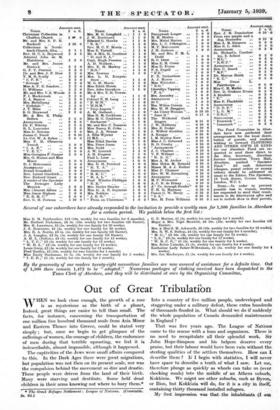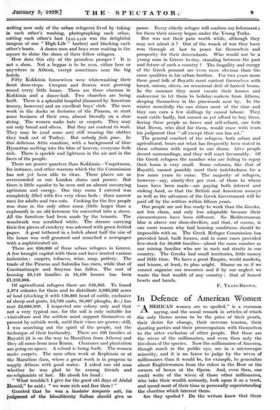Out of Great TribulatiOn
WHEN we look close enough, the growth of a rose is as mysterious as the birth of a planet, Indeed, great things are easier to tell than small. The facts, for instance, concerning the transportation of one million five hundred thousand souls from Asia Minor and Eastern Thrace into Greece, could be stated very simply ; but, once we begin to get glimpses of the sufferings of women, the courage of children, the endurance of men during that terrible uprooting, we feel it is indescribable, almost impossible, although it happened.
The captivities of the Jews were small affairs compared to this. In the Dark Ages there were :great migrations, but population was not then on its present scale, nor was the compulsion behind the movement so dire 'and drastic. These people were driven from the land of their birth. Many were starving- and destitute. Some held dead children in their arms knowing not where to bury them.*
* The Greek Refugee Settlement: beague of Nations. (Constable.
2s. Eld.)' .
Into a country of five million people, undeveloped and staggering under a military defeat, these extra hundmds of thousands flooded in. What should we do if suddenly the whole population of Canada demanded maintenance in England ?
That was five years ago. The League of Nations came to the rescue with a loan and organizers. There is no need to recapitulate all their splendid work. Sir John Hope-Simpson and his helpers deserve every praise, but their labour would have been vain without the. sterling qualities of the settlers themselves. How can I describe them ? If I begin with statistics, I will never have space to describe a tenth of what I saw. Let me, therefore plunge as quickly as wheels can take us (over. shocking roads) into the middle of an Athens suburb, Kokkinia.. We might see other suburbs, such as Byron, or Ilion, tont liokkinia will do, for it is a city in itself, containing• thirty thousand installed refugees. _ My first impression was that, the inhabitants (I am. Writing now only of the urban refugees) lived by taking in each other's washing, photographing each other, cutting each other's hair (xe.i-AAN. was the delightful. insignia of one " High-Life " barber) and blacking each other's boots. A dozen men and boys were waiting in the square to shine the shoes of their fellow refugees.
How does this city of the penniless prosper ? It is not a slum. Not a beggar is to be seen, either here or anywhere: in Athen:s, except sometimes near the big hotels.
Fifty Kokkinia housewives were whitewashing their front door-steps. Creepers and flowers were growing round every, little house. There are three cinemas in Kokkinia and a dance-hall. Two churches are being built. There is a splendid hospital (financed by American Money, however) and an excellent boys' club. The men work in the docks or factories of the Piraeus, or start 4ome business of their own, almost literally on a shoe string. The women make hats or carpets. They may at only bread and olives. But they are content to wait. They may be (and some are) still wearing the clothes they took out of Turkey. But nobody feels poor. In this delicious Attic sunshine, with a background of blue Hymettus melting into the blue of heaven, everyone feels rich. There is sparkle and lightness in the air and in the faces of the people.
There are poorer quarters than Kokkinia—Vrapetzonai for instance, and other warrens which the the Commission has not .yet been able to clear. These places are as overcrowded as our London slums and poorer.. But there is little squalor to be seen and an almost unvarying optimism and energy. One tiny room I entered was completely filled with five very clean beds : three narrow ones for adults and two cots. Cooking for the five people was done in the only other room (little larger than a cupboard) in an old kerosene tin converted into a stove. All the furniture had been made by the tenants. The woodwork was scrubbed white. The dresser carrying their few pieces of crockery was adorned with green fretted paper. A goat tethered in a hutch about half the size of the house was well groomed and munched a newspaper with a sophisticated air. There are 850,000 of these urban refugees in Greece. A few brought capital with them and have started various industries : carpets, tobacco, wine, soap, pottery. The trade of the Piraeus and Salonika has risen, while that of Constantinople and Smyrna has fallen. The cost of housing 23,143 families in 18,450 houses has been 11,253,686.
Of agricultural refugees there are 549,565. To found 1,974 colonies for them and to distribute 2,030,232 acres of land (stocking it with 150,801 head of cattle, exclusive of sheep and goats, 2+,783 carts, 58,987 ploughs, &c.) has cost £9,088,996. I inspected one colony only and that not a very typical one, for the soil is only suitable for -viniculture and the settlers must support themselves at present by outside work, until their vines are grown; still, I was searching out the spirit o,f the people, not the technique of their husbandry. There are 108 families at Boyatti (it is . on the way to; Marathon from Athens) and they all come from near Konia. Clearance, and plantation are going on apace. A school is being built. . The women make carpets. The men often work at Kephissia or at the Marathon dam, where a great work is in progress to supply .Athens with good water. I asked one old man whether he was glad to be among friends and co-religionists at last. He shook-his head : " What wouldn't. I give for the good old days of:Abdul Kamidi" he said ; " we: were rich and free then I " Granted that- he was laudator temporis aeli, his judgment of the bloodthirsty. Sultan _should give us pause. Every elderly refugee will confirm my informant;. for them their misery began under the Young Turks.
But was not their pain worth while, although they may not admit it ? Out of the wrack of war they have won through at last to peace for themselves and prosperity for their descendants. Who would not be a young man in Greece to-day, standing between the past and future of such a country ? The frugality and energy of the Greek peasant are even more obvious than the same qualities in his urban brother. For two years more these good folk of Boyatti must content themselves with bread, onions, olives, an occasional dish of haricot beans. In the summer they must vacate their houses and endeavour to let them to holiday-makers from Athens, sleeping themselves in the pinewoods near by. In the winter mercifully the sun shines most of the time and they can earn a few shillings by casual labour. They, want cattle badly, but cannot as yet afford to buy them. Seeing these people so brave and self-reliant, one feels, that Byron, who died for them, would erase with tears his judgment that " all except their sun has set."
The general conduct of the refugees, both urban and agricultural, bears out what has frequently been stated in these columns with regard to our slums. Give people decent surroundings, and they will react favourably. Of the Greek refugees the number who are failing to repay their loans is very small. Some colonies, like that of Boyatti, cannot possibly meet their indebtedness for a few more years to come. The majority of refugees, however—say, ninety-five per cent. of those to whom loans have been made—are paying both interest and sinking fund, so that the British and American moneys as well as 'the advances of the Greek Government will be paid off by the settlers within fifteen years.
Our people are not less ready.to work than the Greeks, not less clean, and only less adaptable because their circumstances have been different. No Mediterranean blue is above our slum-dwellers, and that, of course, is one more reason why bad housing conditions should be impossible with us. The Greek Refugee Commission has provided land, built houses, and in some cases provided live-stock for 50,000 families—about the same number as our mining families who are in such sad straits in our country. The Greeks had small territories, little money, and little time. We have a great Empire, world markets, and leisure, at least, to plan aright. Shame on us if we cannot, organize our resources and if by our neglect we waste the best wealth of any country that of honest hearts and hands.
F. YEATS-BROWN.







































 Previous page
Previous page